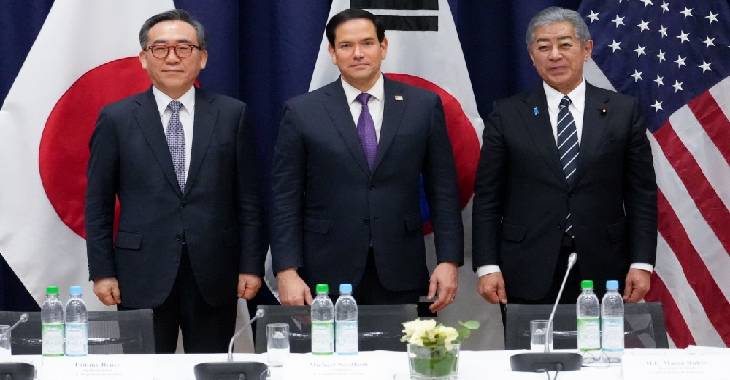The US, Japan, and South Korea met on the margins of the Munich Security Conference 2025 to discuss security scenarios in the Indo-Pacific and North Korea.
US Secretary of State Marco Rubio, Japanese Foreign Minister Iwaya Takeshi, and South Korean Foreign Minister Cho Tae-yul emphasised their shared commitment to ensuring the three countries’ and the Indo-Pacific region’s safety, security, and prosperity, according to a joint statement released by the US State Department.
They reaffirmed their firm commitment to the complete denuclearisation of the Democratic People’s Republic of Korea (DPRK) in accordance with United Nations Security Council Resolutions (UNSCRs), expressing grave concerns about and the need to address the DPRK’s nuclear and missile programs, as well as malicious cyber activities.
The trilateral cooperation condemned North Korea’s grave breaches of human rights, as well as its nuclear and missile programs, and promised to take decisive measures to resist threats, strengthen economic resilience, and advance shared interests.
They reaffirmed their commitment to strengthening defence and deterrence while emphasising their common commitment to the safety, security, and prosperity of their three countries and the larger Indo-Pacific region.
They expressed their opposition to any unilateral moves to change the status quo in Indo-Pacific waters, especially the South China Sea, and highlighted their commitment to maintaining a free and open Indo-Pacific while upholding international law.
The relationship is primarily intended to oppose China’s assertive Indo-Pacific policies as well as North Korea’s nuclear threats.
In the North China Sea, China and Japan are at odds over the Senkaku Islands’ territorial status. The trilateral collaboration works together to advance its security infrastructure in the Indo-Pacific, countering China’s aggressiveness and ensuring regional peace and stability.
Last week, President Donald Trump and Japanese Prime Minister Shigeru Ishiba met in Washington, DC, to reaffirm their commitment to pursuing a new golden age in bilateral relations that upholds a free and open Indo-Pacific while ensuring peace and prosperity.
Notably, North Korean President Kim Jong Un has never shied away from making nuclear threats against the United States and South Korea in the event of a conflict.
In October 2024, Kim threatened to irrevocably destroy South Korea with nuclear weapons if provoked.
Read More
Zelensky said he is collaborating with President Trump’s staff to resolve the problem with Russia
Lebanon’s President condemns UN convoy attack


